|
|
|
Sort Order |
|
|
|
Items / Page
|
|
|
|
|
|
|
| Srl | Item |
| 1 |
ID:
043274
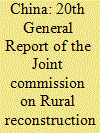

|
|
|
|
|
| Publication |
Taiwan, Taipei, 1969.
|
| Description |
141p.Hbk
|
|
|
|
|
|
|
|
|
|
|
|
Copies: C:1/I:0,R:0,Q:0
Circulation
| Accession# | Call# | Current Location | Status | Policy | Location |
| 008625 | 630.951249/CHI 008625 | Main | On Shelf | General | |
|
|
|
|
| 2 |
ID:
138461


|
|
|
|
|
| Summary/Abstract |
Rural social movements and urban food activists have sought to build food sovereignty because it has the potential to be the foundation of an alternative food system, transcending the deep-seated social, economic and ecological contradictions of the global food economy.
However, continuing to build food sovereignty requires changes to global and local food systems that have to be undertaken in the messy reality of the present. This article therefore presents a series of wideranging, politically challenging but ultimately feasible interventions
that are necessary but not sufficient conditions for its realisation.
|
|
|
|
|
|
|
|
|
|
|
|
|
|
|
|
| 3 |
ID:
131832
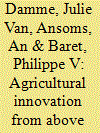

|
|
|
|
|
| Publication |
2014.
|
| Summary/Abstract |
In its 2008 World Development Report, the World Bank pleaded for a 'Green Revolution' for sub-Saharan Africa, pointing particularly to the importance of including smallholder farmers. This article focuses on the banana cropping system in Rwanda, and on the agricultural innovations introduced within this system. We first consider macro-level innovations that are designed to promote a modernized agricultural sector and that correspond to the rationale of the Green Revolution. We analyse how such 'top-down' innovations are received on the ground and show how smallholders seek to evade new government policies when they fail to reflect local economic and social realities. This demonstrates how some rural Rwandans are challenging the authority of the government in disguised ways in order to protect their local livelihoods. The Rwandan experience should inspire continent-wide Green Revolution policies to take account of the risk-coping rationale of small-scale farmers and their capacity to innovate 'from below'.
|
|
|
|
|
|
|
|
|
|
|
|
|
|
|
|
| 4 |
ID:
041338
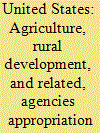

|
|
|
|
|
| Publication |
Washington, U.S. Government Printing Office, 1978.
|
| Description |
1469-2450p.
|
|
|
|
|
|
|
|
|
|
|
|
Copies: C:1/I:0,R:0,Q:0
Circulation
| Accession# | Call# | Current Location | Status | Policy | Location |
| 020340 | 343.076/US 020340 | Main | On Shelf | General | |
|
|
|
|
| 5 |
ID:
144848


|
|
|
|
|
| Summary/Abstract |
This paper examines the influences of Malaysia's Federation Land Development Authority (FELDA) scheme in fostering inclusive rural development. Based on the model of holistic inclusive development, the paper investigates the performance of FELDA from four perspectives: social development, industrialisation, modernisation and basic needs. The main findings of the study indicate that, to a large extent, the scheme has successfully stimulated both the social and economic development of the community. Nonetheless, establishing a strong trust, social cohesion and rapport between the public authorities and community remain the main challenges in determining the success of this state-led agenda. Moreover, keeping traditional values in the modern system will be the key principle for the sustainability of the programme if plans are made to adopt the scheme in other regions.
|
|
|
|
|
|
|
|
|
|
|
|
|
|
|
|
| 6 |
ID:
105755


|
|
|
|
|
| Publication |
2011.
|
| Summary/Abstract |
This review paper deals with colligated aspects of the BioPlus Project (ERA-ARD) implemented by Institute of Technology and Life Sciences (Poland) and Lithuanian University of Agriculture Institute of Agro-Engineering (Lithuania) in cooperation with National University of Life and Environmental Sciences of Ukraine Institute of Ecobiotechnologies and Bioenergy (Ukraine). The drawn inferences intended to be an auxiliary material for policy makers and can briefly indicate on direction of the regional development of rural Ukraine, focusing on: (i) country's specific and sub-regional assessments of renewable energy potentials and spheres of its application; (ii) identification of major barriers for the expansion of renewable energy technologies and policy guidance to overcome those barriers; (iii) recommendations for future actions and strategies concerning renewable energy in Ukraine. The article concludes that low contribution of bioenergy towards rural development is to a large extent driven by energy policy that inhibits the delivery and use of modern energy sources in rural Ukraine. Consequently, an incentive for achieving bioenergy's future that has greater relevance to development of the Ukraine's regions requires a mix of policy tools and institutional actions, briefly summarized in this paper.
|
|
|
|
|
|
|
|
|
|
|
|
|
|
|
|
| 7 |
ID:
052287
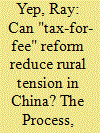

|
|
|
|
|
| Publication |
Mar 2004.
|
| Summary/Abstract |
This article questions the effectiveness and viability of the fiscal response to rural stability adopted by the Chinese state. Tax-for-fee reform (feigaishui) has been heralded as a possible solution to the cancer of excessive fiscal predation by local government. While the experiment may have achieved in relief of peasant burden, the success is simply based on central government financial sponsorship and is thus hardly sustainable as a national programme. And unless there is fundamental reform of fiscal redistribution, the new scheme will ironically hurt rather than help the poorest peasants. Putting all the blame on local cadres is politically expedient, but the central government needs to admit that the present crisis is a result of the systemic discrimination against peasants and the consequent deficit in financing rural governance. The ultimate solution entails a full-scale eradication of structural bias against the peasantry.
|
|
|
|
|
|
|
|
|
|
|
|
|
|
|
|
| 8 |
ID:
051068
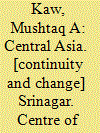

|
|
|
|
|
| Publication |
Srinagar, Centre of Central Asian Studies, University of Kashmir, 1999.
|
| Description |
267p.hbk
|
|
|
|
|
|
|
|
|
|
|
|
Copies: C:1/I:0,R:0,Q:0
Circulation
| Accession# | Call# | Current Location | Status | Policy | Location |
| 048003 | 958/KAW 048003 | Main | On Shelf | General | |
|
|
|
|
| 9 |
ID:
125270
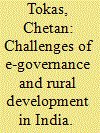

|
|
|
|
|
| Publication |
2013.
|
| Summary/Abstract |
Long distance journeys to government headquarters, accessing copies of public records, meeting officials and submitting applications after seeking information regarding prices in commodity markets is not an uncommon scenario for a rural citizen of a developing country like India. Dealing with all of this stressful mechanism involves the cost of transportation as well as income equivalent to a day's salary.
|
|
|
|
|
|
|
|
|
|
|
|
|
|
|
|
| 10 |
ID:
145742
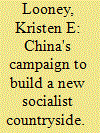

|
|
|
|
|
| Summary/Abstract |
Since the mid-2000s, the Chinese government has promoted village modernization under the banner of “building a new socialist countryside.” To explain the origins and outcomes of this policy, this article examines the case of Ganzhou city in Jiangxi province. Ganzhou became a national model for rural development known for involving organizations called peasant councils in policy implementation. The study found that despite an initial emphasis on rural participation and moderate change, the new socialist countryside evolved into a top-down campaign to demolish and reconstruct villages. Three factors shaped this process: the strength of bureaucratic mobilization, the weakness of rural organizations, and shifting national policy priorities. After obtaining model status, Ganzhou's rural policy became more ambitious and politicized, leaving little space for participation. This insight suggests there are both benefits and costs to China's policy process. Despite the advantages of policy innovation, scaling up local experiments may actually undermine their success.
|
|
|
|
|
|
|
|
|
|
|
|
|
|
|
|
| 11 |
ID:
132953
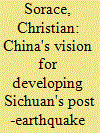

|
|
|
|
|
| Publication |
2014.
|
| Summary/Abstract |
In the aftermath of the 2008 Wenchuan earthquake, government officials, scholars and outside observers eagerly hoped that the emergency relief and reconstruction process would bring about the emergence of civil society and increase grassroots democratic participation. Contrary to this optimistic assessment, this article contends that the local state used the opportunity of the disaster as an experimental laboratory to implement an array of already existing national development plans. The urgency with which the reconstruction was to be completed and the opportunities to meet national development targets as well as access reconstruction funds were too tempting to resist. However, the ham-fisted Leninist implementation style met with local resistance and has contributed to a significant deterioration in local state-society relations. The fact that many local residents continue to question why, despite the huge resources invested by the state in the reconstruction project, they have yet to see any improvement in their economic and overall living conditions points to a deficit of local participation and a breakdown in political communication and trust. By focusing on the different political economies of disaster reconstruction, this article attempts to illuminate the regime's vision for developing the countryside, rural politics, and state-society relations in China more broadly. Unless the state is able to incorporate local needs into its development plans, it will not win the trust and support of local residents, regardless of the amount of money it invests or the benevolence of its intentions.
|
|
|
|
|
|
|
|
|
|
|
|
|
|
|
|
| 12 |
ID:
179989
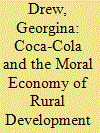

|
|
|
|
|
| Summary/Abstract |
This paper examines the knowledge-practices used by rural activists to raise public concerns about the use of water and land resources by a Coca-Cola bottling plant in Uttar Pradesh, India, between 2004 and 2014. These knowledge-practices included the use of semiotics and carefully crafted discourses—such as slogans and protest songs—to produce knowledge about villagers’ rights to rural subsistence and survival. An aim of this paper is to show the impressive ways in which the social movement persevered by building both public claims to a moral economy as well as village-level practices and institutions that helped to enact visions of what a moral economy could or should be. Of particular significance were activists’ efforts to frame rural water extraction and water rights through a subsistence-focused morality of rural development. This moral economy underscores villager-articulated desires for beneficial forms of economic activity that support rural livelihoods rather than prioritising environmentally destructive corporate activities.
|
|
|
|
|
|
|
|
|
|
|
|
|
|
|
|
| 13 |
ID:
089578


|
|
|
|
|
| Publication |
2009.
|
| Summary/Abstract |
Using a census survey of households in Guizhou Province, this paper examines the patterns of village poverty and inequality and their major correlates. The results show that poverty incidences vary greatly among villages and inequality is relatively high within villages in these impoverished areas. Although agriculture is still the major source of livelihood in this inland western region, income from local nonfarm jobs and remittance is more unevenly distributed and accounts for the largest share of overall income inequality. Surprisingly, blood donation is another major source of cash income. On the expenditure side, health care was found to be one of the most important sources of inequality. The paper also found that the distribution of assets, particularly land holdings, contributes to overall income inequality.
|
|
|
|
|
|
|
|
|
|
|
|
|
|
|
|
| 14 |
ID:
128365


|
|
|
|
|
| Publication |
2014.
|
| Summary/Abstract |
This paper explores the relationship between bioenergy, rural development and related innovation processes in two case studies (Emilia Romagna in Italy-and Norway), for a better understanding of the impacts of different policy regimes on bioenergy innovation. Regional innovation systems theory is used to explain the results emerging from the case studies and to identify the presence of potential elements for innovation. We used policy and relevant literature analysis and a grounded approach based on semi- structured interviews of relevant actors involved in the local bioenergy system. The main findings show that the case studies present consistent differences in terms of policy instruments and socio-political dynamics. Emilia Romagna has major weaknesses and threats that hinder innovation, but some positive potential elements for the future. Norway presents stronger local elements for innovation within local bioenergy systems, such as the employment of local resources and knowledge, but critical market and policy features that threaten further innovation developments. The conclusion draws on the comparative analysis to discuss policy implications of the study.
|
|
|
|
|
|
|
|
|
|
|
|
|
|
|
|
| 15 |
ID:
175103
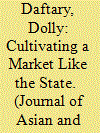

|
|
|
|
|
| Summary/Abstract |
Global policy organizations, financial institutions, and national governments have emphasized high-value agriculture in the world’s semi-arid areas inhabited by the greatest proportion of its poor, stressing linking households to markets to improve their well-being. This is assumed to involve state withdrawal and the ascendance of self-evident market forces. By means of ethnographic fieldwork in semi-arid western India, this paper discusses how the market does not arise spontaneously, but is deepened through state intensification. Rural households are imbricated with new markets by the state’s rendering of development policy market-driven, and through democratic decentralization, which has emerged as an instrument to facilitate the penetration of market actors into remote rural communities.
|
|
|
|
|
|
|
|
|
|
|
|
|
|
|
|
| 16 |
ID:
126939
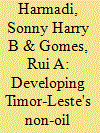

|
|
|
| 17 |
ID:
175892
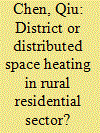

|
|
|
|
|
| Summary/Abstract |
Rural residential space heating is strongly linked to policy considerations related to the clean energy supply and rural sustainable development. As there has been a hot debate on whether to promote district heating in South China, this paper aims to investigate household heating choices with a particular focus on rural residential sector, using the survey data from Sichuan Province. In order to investigate the main influencing factors of household decision-making behaviors, a multinomial logit (MNL) model with sample selection correction and an alternative-specific conditional logit (ASCL) model were used to respectively analyze the actual and stated choices. The estimation results show that energy-specific attributes such as safety level and smoky level have statistically significant effects on household stated preferences for heating systems. Households prefer to adopt lower-cost heating system with high quality energy sources. Among household-specific characteristics, income level, educational level of the decision-maker, household demographic structure, and household location are important determinants of heating fuel choices. These findings suggest that future energy policy should pay more attention to its combined effect on both cost and quality of heating system as well as its different regional effects. Besides, enhancing household socio-economic status should also be attached importance in policy design.
|
|
|
|
|
|
|
|
|
|
|
|
|
|
|
|
| 18 |
ID:
112293


|
|
|
|
|
| Publication |
2012.
|
| Summary/Abstract |
Rising and sometimes volatile fuel prices pose a challenge for rural organizations reliant on long distance transport. To understand the coping mechanisms used by such organizations, we survey rural business strategies in Israel, where fuel prices are high and urban development is concentrated in the country's geographic center. The businesses surveyed are operated by kibbutzim, historically collective communities that are now in various stages of privatization. Analysis of the 'transport strategies' employed by nearly 100 organizations in three regions of varying remoteness and isolation shows that firms rely on distinct strategies such as localization and high value density. Localization was found to be prevalent in all regions, as it requires little capital investment. Strategies exploiting high value density, including information-based services, were prevalent in remote and isolated regions where sensitivity to transport costs is acute. Non-remote firms were less inclined toward strategic adaptation, preferring non-disruptive changes such as cheaper shipping modes. The development implications of these transport strategies are consistent with rural economic trends observed throughout the developed world. If transport costs continue to rise, rural firms may shrink the radius of their sales and labor pools, or search for more lucrative products to reduce their relative transport costs.
|
|
|
|
|
|
|
|
|
|
|
|
|
|
|
|
| 19 |
ID:
098604


|
|
|
|
|
| Publication |
2010.
|
| Summary/Abstract |
A lack of access to energy and, in particular, electricity is a less obvious manifestation of poverty but arguably one of the most important. This paper investigates the extent to which electricity access can be investigated using night-time light satellite data and spatially explicit population datasets to compare electricity access between 1990 and 2000. We present here the first satellite derived estimates of rural population without access to electricity in developing countries to draw insights on issues surrounding the delivery of electricity to populations in rural areas. The paper provides additional evidence of the slow progress in expansion of energy access to households in Sub-Saharan Africa and shows how this might be ascribed in part due to the low population densities in rural areas. The fact that this is a continent with some of the lowest per-capita income levels aggravates the intrinsic difficulties associated with making the investments needed to supply electricity in areas with low population density and high dispersion. Clearly, these spatial dimensions of the distributions of the remaining unelectrified populations in the world have an impact on what options are considered the most appropriate in expanding access to these households and the relative attractiveness of decentralized options.
|
|
|
|
|
|
|
|
|
|
|
|
|
|
|
|
| 20 |
ID:
162909
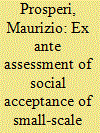

|
|
|
|
|
| Summary/Abstract |
Social acceptance is a relevant determinant of the development of agro-energy systems because its absence can cause delays or even the abandonment of innovative projects. This paper aims at an ex ante assessment of the socio-political acceptance of small-scale agro-energy systems in rural areas located in southern Italy, according to the bioenergy village approach. Starting from a theoretical model, we investigated the key factors influencing the perception of the risks and benefits of the realization of a biomass combustion plant, by a statistical survey on a sample of 152 members of the local community living in eight municipalities located in a rural area. Through exploratory and confirmatory statistical analyses, we identified two key factors: (a) the economic, environmental, and social benefits for the community and (b) reassurance from the energy company management. This research shows that it is very important to consider these elements in order to facilitate dialogue and the debate within the local community. In this way, the involved actors will be enabled to express their expectations to decision makers and policymakers, thus contributing to the steering of the project. In other words, community involvement and the democracy of the energy policy processes are favoured.
|
|
|
|
|
|
|
|
|
|
|
|
|
|
|
|
|
|
|
|
|